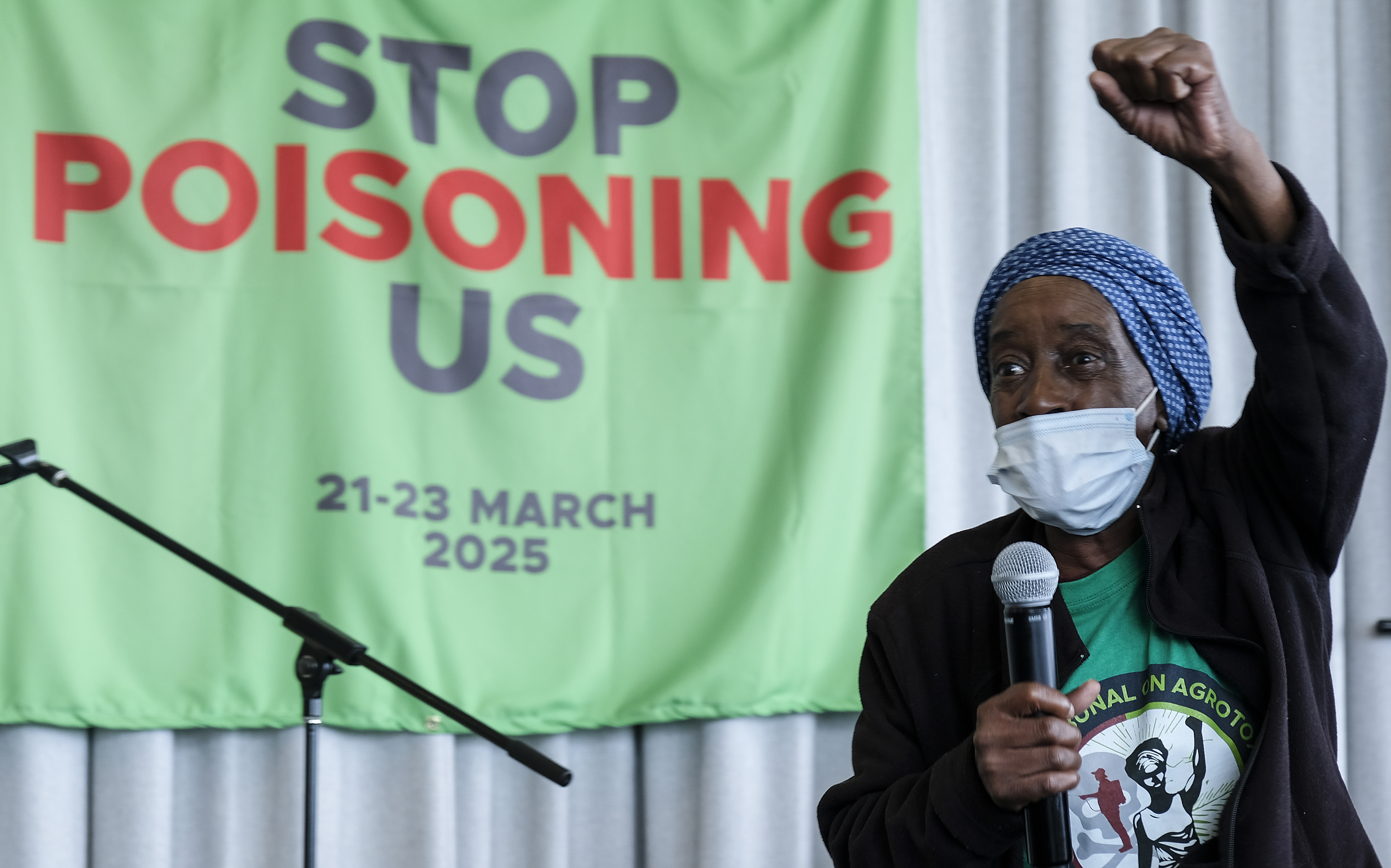In June 2025, eight months after the much-publicised deaths in October 2024 of six children in Soweto from Terbufos poisoning, the South African government finally banned the toxic pesticide, which had contaminated spaza shop-bought snacks eaten by the children.
/file/dailymaverick/wp-content/uploads/2025/09/Peoples-Tribunal-Pic-1-1-1.jpeg)
/file/dailymaverick/wp-content/uploads/2025/09/DSF3592.jpg)
These deaths were not the first as a result of pesticide poisoning – just the most recent in a long line of similar tragedies resulting from unregulated use of a range of deadly chemicals.
In 2023, the environmental justice organisation Groundwork says, experts published research showing that in one Cape Town mortuary, out of 50 children whose deaths were thought to be caused by pesticides, 29 had died from Terbufos poisoning. Four others had died from two other organophosphates (methamidophos and diazinon). Of these deaths, almost half (42.6%) were children under five. Among children surviving organophosphate poisoning, there is increasing evidence that they suffered major and lifelong neurodevelopmental damage.
Designed to be used in commercial agriculture, but in South Africa used illegally as a “street pesticide” in areas with poor sanitation, Terbufos – along with dozens of other pesticides in the “organophosphate” class of chemicals – has been banned in the European Union since 2009.
Even when used legally, in commercial agriculture, exposure to organophosphates can cause respiratory distress, vomiting, diarrhoea, seizures, paralysis, coma and death.
In 2009, the World Health Organization and the Food and Agriculture Organization of the United Nations recommended that Terbufos – and dozens of other “highly hazardous pesticides” – be eliminated from use worldwide. In 2010, South Africa’s Department of Agriculture, Forestry and Fisheries committed to phase out or ban 116 “highly hazardous pesticides” (HHPs).
/file/dailymaverick/wp-content/uploads/2025/09/DSF3627.jpg)
For 12 years, the government took no action on this. It is estimated that there are still at least 176 HHPs in legal use in the country. (It is difficult to know exactly how many HHPs are registered for use because there is no publicly available database of registered chemicals. Not even government departments have access to the proprietary database, which is administered by the industry umbrella body, CropLife.)
In April 2022, the Registrar of the agriculture department promised to phase out the 116 HHPs by June 2024. Ultimately, only 28 were identified for phasing out (not including Terbufos, at that time), but no action was taken on this, either.
No comment
Daily Maverick asked the Department of Agriculture for comment on this, as well as on what plans are in place to ensure South Africa is up to date on pesticides regulation and enforcement, but had not received a reply by the time of publication.
“For over two decades, the South African government has consistently failed to respond to the scientific findings produced by the research community, despite the persistent advocacy efforts of civil society organisations to draw attention to this,” said Mariam Mayet, director of the African Centre for Biodiversity, in an email to Daily Maverick.
“The recent and welcome ban on Terbufos, as a result of a Cabinet decision in June 2025, primarily stemmed from public outcry and activism, and the interventions by the three jurors of SAPToA [the South African People’s Tribunal on Agrotoxins],” Mayet wrote. “Yet, calls for the banning of Terbufos predated this unfortunate tragedy, pointing to abject regulatory failure on the part of the state,” Mayet said.
The tribunal, a two-day “people’s court” held in Stellenbosch, Western Cape, on 22-23 March 2025, was a forum for farmworkers’ long-unheard grievances about the harms to their health and the environment from farmers’ unregulated use of HHPs, as well as expert testimony on pesticides.
Though the tribunal had no legal or policymaking authority, Judge Navi Pillay, one of the three jurors, said it aimed to “put the government on trial in the court of public opinion for gross dereliction of its constitutional duties to protect the right to life”, by giving the floor to – and amplifying – the voices of many individuals and groups that have been harmed by exposure to harmful pesticides, mostly in the course of agricultural work.
Minister of Agriculture John Steenhuisen did not attend the tribunal, but two months later, in May, all three SAPToA jurors – former UN Human Rights Commissioner Judge Pillay, occupational medicine specialist Dr Sophia Kisting-Cairncross and SA Human Rights Commissioner Philile Ntuli – addressed the parliamentary agriculture committee.
This was a follow-up to a meeting held between the committee and the South African Human Rights Commission in February 2025, during which the committee raised serious concerns about the human rights implications of the use of Terbufos and related pesticides.
The South African People’ Tribunal on AgroToxins was formed by the SA Human Rights Commission and a coalition of communities, civil society groups, trade unions and academics intent on holding government to account for exposure to the dangers of toxic pesticides in South Africa.
The tribunal’s chairperson, Pillay, co-jurors Kisting-Cairncross and Ntuli will publish a “verdict” on the March 2025 two-day hearing in September 2025. DM
Adèle Sulcas is senior adviser to Daily Maverick’s Food Justice project. She writes about food systems, health and climate.






 Retired farm worker Dina Ndlovu testified at the the South African People’s Tribunal on Agrotoxins about being put off work after suffering severe respiratory illness due to exposure to the highly hazardous pesticide, Dormex. (Photo: Natasha Foote)
Retired farm worker Dina Ndlovu testified at the the South African People’s Tribunal on Agrotoxins about being put off work after suffering severe respiratory illness due to exposure to the highly hazardous pesticide, Dormex. (Photo: Natasha Foote)